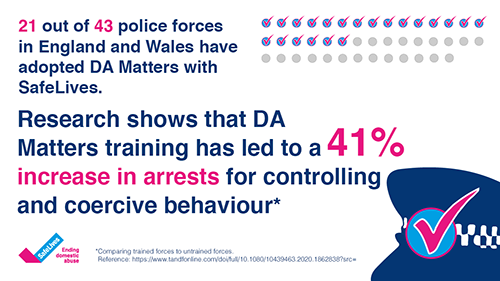SafeLives
Creating sustainable improvements in the police response to domestic abuse
SafeLives is a UK-wide charity dedicated to ending domestic abuse by conducting research, influencing policy and training professionals and organisations.

DA Matters Graphic
Domestic Abuse Matters is a cultural change programme designed to create sustainable improvements in the police response to domestic abuse.
Those in the police service can be called to up to five incidents of domestic abuse per duty. Their response to these calls for service in 2014 was judged by the independent inspector of police services (HMIC) to be “inadequate”.
The charity wanted to establish the standard of the service that was needed from the police and the training that would be required to achieve this. The author of Domestic Abuse Matters, herself a former police officer and survivor of domestic abuse, researched the needs of other survivors, police officers and call takers nationally.
By the end of 2020 SafeLives had delivered the programme to 20 police forces and was about to start in several others.
The full programme consists of several components including a force health check and training of local trainers and first responders. The charity has trained more than 15,000 frontline officers and over 2,000 officers as Domestic Abuse Matters champions.
A recent evaluation by the University of Hull found that the programme has a positive and sustained impact on forces trained and has led to a 41% increase in arrests for controlling and coercive behaviour.
As a result of the success of Domestic Abuse Matters, the charity has now developed a similar change programme for children’s social care and has plans to develop programmes for all statutory agencies. It aims to ensure that all those responding to domestic abuse have the same understanding, empathy and skills and can work collaboratively to provide the best multi-agency service to families experiencing domestic abuse.
Charity Awards judge Chris Sherwood said that building awareness within the police of domestic violence and coercive and controlling behaviour could not be more topical right now and that this was an innovative approach. “I also liked that it brought survivors’ voices to the table,” he added.
CC Reg no. 1106864

